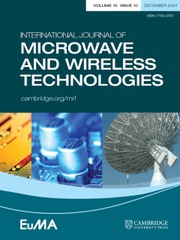Design and qualification of Ku-band-radiating chains for receive active array antennas of flexible telecommunication satellites
Published online by Cambridge University Press: 05 May 2020
Abstract
Airbus Italia recently developed enhanced passive components as key elements for its telecommunication Ku-band antenna product lines, tailored to reconfigurable payloads. This paper describes the design and qualification of a dual linear polarization Ku-band-radiating chain, developed for the DRA receive (Rx) active antennas embarked on the Eutelsat Quantum satellite. The feed chain covers the entire Ku-band frequency range allocated for fixed satellite services providing receive functionality and embedding sharp rejection features over the adjacent transmit band. The proposed design provides high radiation efficiency (>90%) and polarization purity (XPD > 33 dB), together with low RF losses and flat group-delay variation over a 13% fractional bandwidth, keeping a compact size and reduced axial length. The unit has been optimized for high reproducibility in high volume productions, typical of large DRA applications, for which stringent mass and dimensional constraints, as well as excellent amplitude and phase tracking among similar units, are key features. Details of the feed chain design and an overview of RF and environmental qualification test results are presented.
Keywords
- Type
- Industrial and Engineering Paper
- Information
- International Journal of Microwave and Wireless Technologies , Volume 12 , Special Issue 6: EuCAP 2019 Special Issue , July 2020 , pp. 487 - 503
- Copyright
- Copyright © Cambridge University Press and the European Microwave Association 2020
References
- 7
- Cited by



